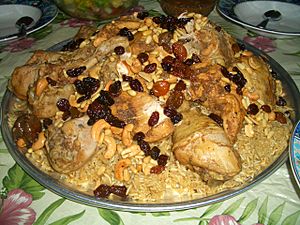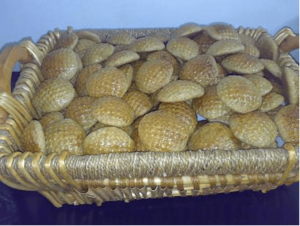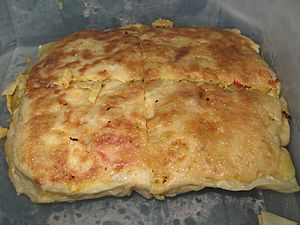Saudi Arabian cuisine facts for kids
Saudi Arabian cuisine is all about the yummy foods and drinks found in Saudi Arabia. Even though some dishes are popular everywhere, the food can be quite different from one part of the country to another. This is because each region has its own unique culture!
Contents
Traditional Saudi Foods
Common Ingredients
Saudi Arabian cooking often uses ingredients like wheat and rice. You'll also find lots of lamb and chicken. Yogurt and potatoes are common too. Since Saudi Arabia has a long coastline, seafood is important in some areas. And don't forget dates – they are a very important fruit there!
Popular Dishes to Try
Here are some other popular foods and dishes you might find:
- Hininy
- Madfoon
- Mandi
- Jalamah
- Ka'ak
- Kabsa
- Khmer
- Markook (a type of bread)
- Aseedah
- Mutabbaq
- Sambusak (like a samosa)
- Saleeg
- Dates mohalla
- Mabshoor
- Manthoo
- Roz bukhari
- Kanafeh (a sweet dessert)
- Muhallebi (a milk pudding)
- Basbousa (a sweet cake)
- Umm Ali (another sweet dessert)
Traditional Drinks
In Saudi Arabia, drinking Gahwah (Arabic coffee) is a big part of showing kindness to guests. It's a sign of being welcoming and generous.
Long ago, people would roast, cool, and grind coffee beans right in front of their guests. They would use a special tool called a mortar and pestle. Then, they would add cardamom pods to the coffee while grinding it. After brewing, the coffee was poured for everyone.
Today, coffee is usually prepared beforehand. It is served beautifully in a special pot called a dallah. Guests drink it from small cups called finjan.
Yogurt is also made into a popular drink called laban.
Sobia is a cool drink that is very popular, especially during Ramadan. It's made from a slightly fermented mix of barley or brown bread, date palm sap, herbs, and spices. Sobia can be white or colored, depending on its flavor.
Fast Food and Restaurants
Chain restaurants are becoming more common in Saudi Arabia. They are growing faster than smaller, independent restaurants.
One very popular Saudi-owned chain is Al Baik. They are famous for their fried chicken. Al Baik has even opened restaurants in other nearby countries.
Food Rules in Islam
Islamic dietary laws guide what Muslims can eat and drink. In Saudi Arabia, these rules are followed strictly. For example, eating pork and drinking alcoholic beverages are not allowed. Also, animals must be prepared in a special way called halal before they can be eaten.
During the holy month of Ramadan, Muslims fast from sunrise to sunset. When it's time to break their fast in the evening, they often start with dates, water, and Arabic coffee. The coffee gives them energy from its caffeine. The dates provide carbohydrates and iron, which also help to energize them. This helps them feel strong for the special evening prayers called Tarawih.
See also
 In Spanish: Gastronomía de Arabia Saudita para niños
In Spanish: Gastronomía de Arabia Saudita para niños
 | Emma Amos |
 | Edward Mitchell Bannister |
 | Larry D. Alexander |
 | Ernie Barnes |




